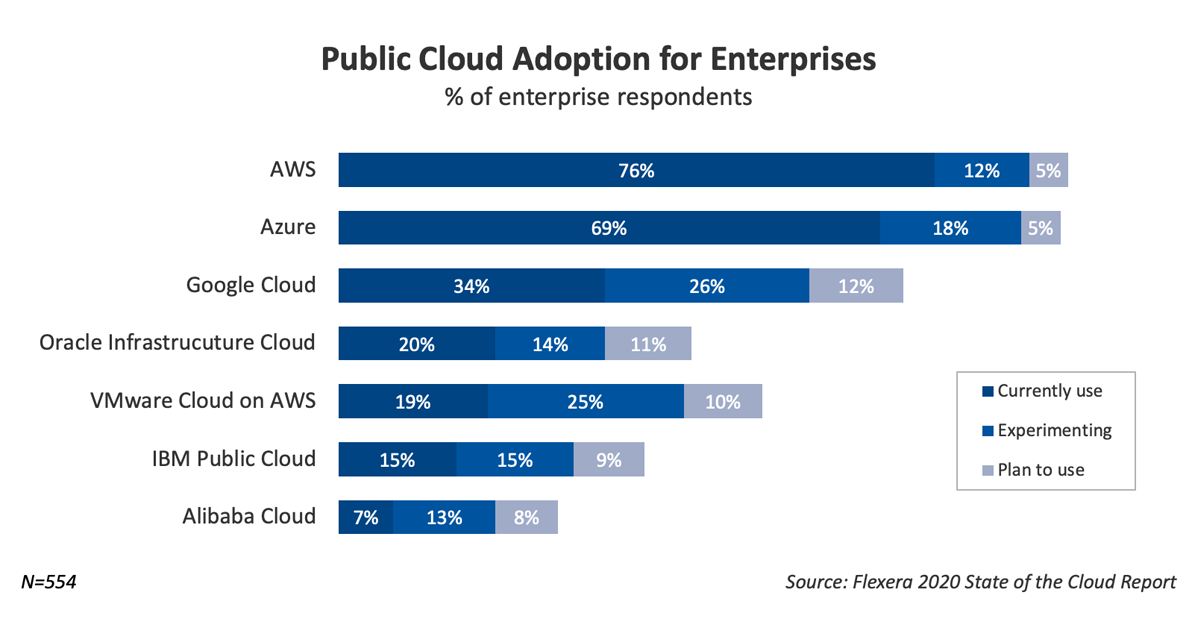Amazon Web Services – With a vast tool set that continues to grow exponentially, Amazon’s capabilities are unmatched. Yet its cost structure can be confusing, and its singular focus on public cloud rather than hybrid cloud or private cloud means that interoperating with your data center isn’t AWS’s top priority.
Microsoft Azure – A close competitor to AWS with an exceptionally capable cloud infrastructure. If you’re an enterprise customer, Azure speaks your language – few companies have the enterprise background (and Windows support) as Microsoft. Azure knows you still run a data center, and the Azure platform works hard to interoperate with data centers; hybrid cloud is a true strength.
Google Cloud – A well-funded underdog in the competition, Google entered the cloud market later and doesn’t have the enterprise focus that helps draw corporate customers. But its technical expertise is profound, and its industry-leading tools in deep learning and artificial intelligence, machine learning and data analytics are significant advantages.

Vendor | Strengths | Weaknesses |
AWS | • Dominant market position | • Difficult to use |
Microsoft Azure | •Second largest provider | •Issues with documentation |
• Designed for cloud-native businesses | • Late entrant to IaaS market |
Cloud Services Comparison List:
Compute
Storage
Networking and Content Delivery
Database
Management and Monitoring
Security
Developer Tools
Compute
Calculate, process, and compute—a computer’s fundamental role. In addition, the right cloud provider can scale to thousands of processing nodes for you in just a few minutes.
Service | Amazon Web Services | Google Cloud Platform | Microsoft Azure |
Deploy, manage, and maintain virtual servers | |||
Platform-as-a-Service | App Engine Standard Environment App Engine Flexible Environment | ||
Virtual private servers made easy | |||
Management support for Docker/Kubernetes containers | |||
Docker container registry | |||
Orchestrate and manage microservice-based applications | |||
Integrate systems and run backend logic processes | |||
Run large-scale parallel and high-performance batch computing | |||
Automatically scale instances | Virtual Machine Scale Sets App Service Scale Capability (PAAS) AutoScaling |
Storage
A key function of cloud services is its storage capabilities. While AWS’ storage services are the longest running, Google’s and Microsoft Azure’s are also very respectable and reliable options.
Service | Amazon Web Services | Google Cloud Platform | Microsoft Azure |
Object storage service for use cases | |||
Virtual server disk infrastructure | |||
Archive storage | |||
Create and configure shared file systems | |||
Hybrid storage | |||
Bulk data transfer solutions | |||
Backup | |||
Automatic protection and disaster recovery |
Networking and Content Delivery
Each provider offers different networks and partners which interconnect their data centers across the globe using a variety of different products to achieve this.
Service | Amazon Web Services | Google Cloud Platform | Microsoft Azure |
Isolated, private cloud private networking | |||
Cross-premises connectivity | |||
Manage DNS names and records | |||
Global content delivery networks | |||
Dedicated, private network connection | |||
Load balancing configuration |
Database
All three providers allow you to implement both SQL and NoSQL solutions. Alternatively, if you don’t need a database, go for their caching capabilities instead.
Service | Amazon Web Services | Google Cloud Platform | Microsoft Azure |
Managed relational database-as-a-service | |||
NoSQL (Indexed) | |||
NoSQL (Key-value) | |||
Application or Memory Caching | |||
Database migration | |||
Managed data warehouse |
Management and Monitoring
Each of the top three offers a range of management and monitoring services which provide visibility into the health, performance, and utilization of applications, workloads, and infrastructure.
Service | Amazon Web Services | Google Cloud Platform | Microsoft Azure |
Cloud advisor capabilities | |||
DevOps deployment orchestration | |||
Cloud resources management & monitoring | Stackdriver Monitoring Cloud Shell Debugger Trace Error Reporting | ||
Administration | Application Discovery Service Systems Manager Personal Health Dashboard | Log Analytics Operations Management Suite Resource Health Storage Explorer | |
Billing |
Security
Here, we cover the range of capabilities provided to protect services and data.
Service | Amazon Web Services | Google Cloud Platform | Microsoft Azure |
Authentication and authorization | |||
Information Protection | |||
Protect and safeguard with data encryption | |||
Hardware-based security modules | |||
Firewall | |||
Cloud security assessment and certification services | |||
Directory services | |||
Identity management | |||
Support cloud directories | |||
Compliance | |||
Cloud services with protection |
Developer Tools
And finally, the tools you need to build, deploy, diagnose, debug, and manage multiplatform, scalable applications and services.
Service | Amazon Web Services | Google Cloud Platform | Microsoft Azure |
Media transcoding | |||
Improve and optimize workflow | |||
API management | |||
App testing | |||
Git Repositories | |||
DevOps | |||
Programmatic access | |||
Predefined templates | |||
Managed hosting platforms | Web Apps (App Service) Cloud Services API Apps (App Service) | ||
Application deployment | |||
Developer Tools |

